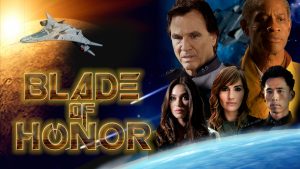 Initially, Ryan T. Husk was going to sit in on that fascinating conversation that I recently had with Alec Peters and Mike Bawden about the Realities of Crowd-funding. But ironically (or perhaps appropriately) Ryan couldn’t participate because he was busy launching a Kickstarter campaign for a brand new, original sci-fi fan series call Blade of Honor.
Initially, Ryan T. Husk was going to sit in on that fascinating conversation that I recently had with Alec Peters and Mike Bawden about the Realities of Crowd-funding. But ironically (or perhaps appropriately) Ryan couldn’t participate because he was busy launching a Kickstarter campaign for a brand new, original sci-fi fan series call Blade of Honor.
Even though Ryan’s new project wasn’t technically a Star Trek fan film, it features a number of Star Trek actors both from the various television series as well as several Star Trek fan film veterans. So even though I usually limit myself to mainly Star Trek fan films, I was intrigued enough by Blade of Honor that I figured I’d make an exception.
What I didn’t expect was to get some of the most amazing insights from Ryan…so much so that I was almost tempted to turn this interview into parts 5 and 6 of “The Realities of Crowd-Funding” 4-parter! Instead, just sit back and enjoy one of the most thoughtful fan filmmaker interviews I’ve done so far…
JONATHAN: My first question, Ryan, is for all my readers who are used to seeing me talk almost exclusively about Star Trek fan films. But Blade of Honor is more of a general sci-fi independent film…so why should Star Trek fans be getting excited about your project?
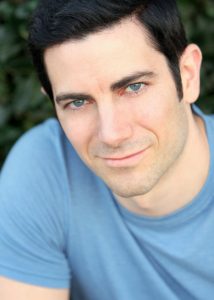
RYAN: That’s an excellent question; I’m glad you asked it. Being a huge Star Trek fan myself and going to conventions, I can say that we generally don’t only like Star Trek. We also enjoy the Star Trek characters, we enjoy the Star Trek actors. We enjoy the Star Trek theme. We enjoy sci-fi. For me, and for anyone I’ve ever seen at a convention, what’s the first thing that we ask if we see, say, William Shatner, or we see Kate Mulgrew or Avery Brooks or anybody like that? If you meet them or talk to them or see them on stage, you say, “So, what are you doing now? What’s your next project? What can we see you in?” And we’re asking that because we want more William Shatner or we want more Tim Russ or we want more Roxanne Dawson.
And what we’re doing with Blade of Honor is we’re providing more Tim Russ. We’re providing more Aaron Eisenberg. We’re providing more Cirroc Lofton. So for me, above all, the reason Star Trek fans should care about it is because it has Star Trek actors in a sci-fi TV series.
JONATHAN: So what is Blade of Honor about?
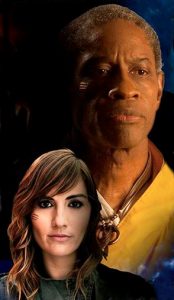
RYAN: People can read more about the story on our website or on our Kickstarter page, but here’s what should make fans excited (in a nutshell). It’s a strong female lead—think of Arina Katardes like a “Starbuck” character from the new Battlestar Galactica—and I like to look at it as a series that’s a cross between Battlestar Galactica and Enemy Mine…if you remember the old movie with Louis Gossett, Jr. and Dennis Quaid. But it also has political intrigue and religious implications, and that comes together in a really juicy role for Tim Russ as Grand Master Yuni, who is a mystical spiritual leader but also a shrewd political manipulator with a secret fear that one of his students might someday achieve even greater power and influence than he has and destroy him. It’s an awesome role for Tim.
JONATHAN: Is there any fan film now that Tim Russ is not appearing in? (Laughter.) I mean, he’s doing Renegades, he’s doing Blade of Honor, and Tommy Kraft had announced that Tim Russ was joining the cast of Project Discovery before the production was canceled.
RYAN: Y’know, I was just noticing that, too. He’s gotta be the busiest guy in the independent sci-fi community…and I love it! The cool thing about Tim—and I don’t want to speak for him—what I’ve seen is there are two kinds of Star Trek actors. There are the kind that say, “My life is the best thing in the world because I just worked seven years on a sci-fi series that I did or didn’t care about, and I have millions of dollars in my pocket and millions of adoring fans. This is the good life; I’m just gonna hang out and do whatever…travel and raise kids. Then you have the other kind of Star Trek actor who says, “I worked seven years on a sci-fi TV show, millions of adoring fans, millions of dollars…and I wanna keep working every single day of my entire life because this is fun as hell.”
And Tim Russ is the latter in that he doesn’t seem to want to just rest on his laurels and retire. It seems like he’s one of those people that wasn’t just doing it solely for the money and success but also because he loves acting. He loves doing things. He loves being a part of something.
Another person who’s like that is a friend of mine named Faran Tahir. He was a villain in the first Iron Man movie. He was also captain of the USS Kelvin in the 2009 Star Trek movie. Really great actor; I love him. And I was working with him on a production called Space Command, and he said something to me that made me smile, “Hey, as long as I’m workin’!” That’s the mentality that a lot of actors have where they just want to work. They just want a good product. Of course, they’re not gonna take just anything—they’re not gonna take crap—but given the choice between working on something good or taking a vacation, they work on something good…whereas others take the vacation.
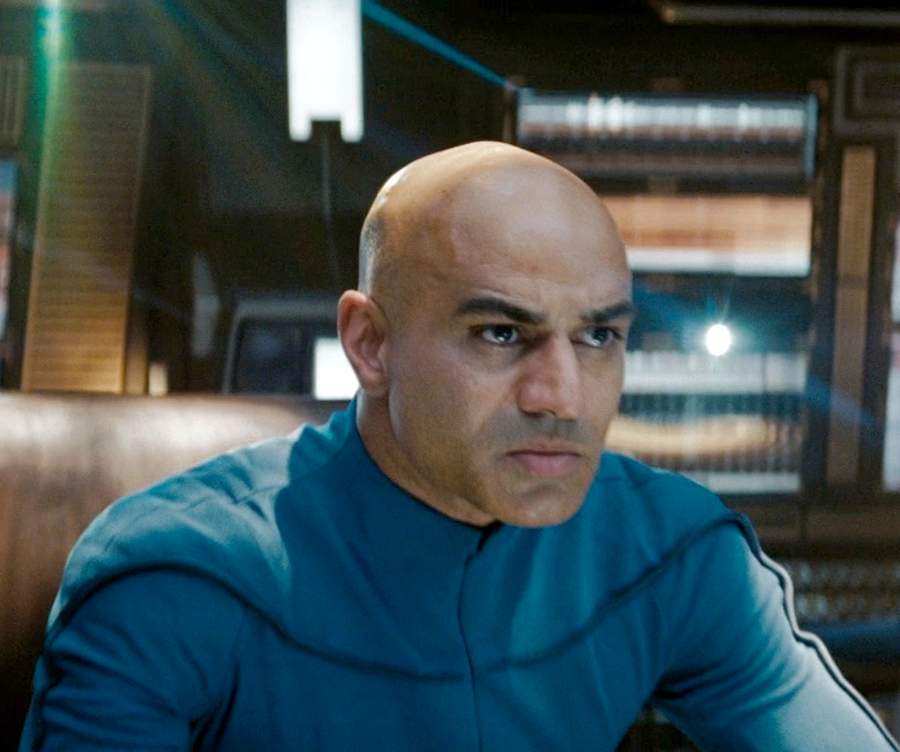
JONATHAN: Speaking of actors who’ve been in a lot of Star Trek fan films, you’ve kinda popped up just about everywhere yourself, haven’t you?
RYAN: Well, let’s see. I’ve acted in Star Trek: Renegades; I’ve been part of the crew of Renegades. I’m actually the co-producer of Renegades now, and that’s the great thing about these productions is the ability to move up. I came in as, like, the “bottom-feeder” volunteer guy in the pilot, and now I’m helping to produce it. In between then and now, I’ve acted in Star Trek: Horizon with Tommy Kraft, which was awesome. I got to be a Romulan…
JONATHAN: I saw that. You were excellent.
RYAN: Oh, thank you very much. Tommy is great to work with. I love that dude.
JONATHAN: Me, too. He’s totally awesome.
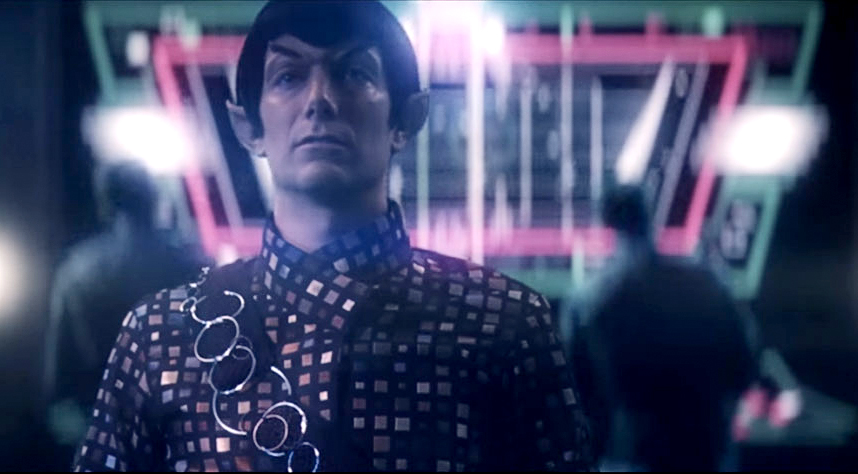
RYAN: So let’s see, Star Trek Continues, I’ve acted in two of those episodes. I was part of a really short clip as a Tellarite in episode 2 [“Lolani” -Jonathan], and I was some mirror universe red shirt guy in episode 3 [“Fairest of Them All” -Jonathan]. And I really like them a lot because they’ve got the family feel. So even if you’ve just got a small role with a couple of lines, you’re part of the family. And then they invite you to the events, and they invite you to functions, and they treat you like you’re one of them. And that’s really great, and that’s what I try to also create in the productions that I do.
Let me see, I was cast as the lead actor in a fan film that closed down recently called Star Trek: Futures. I don’t know if you heard of it, but it was about the Enterprise-C with Lt. Cmdr. Jack Crusher being the lead. And so it was kinda like the Jack Crusher family—young Jack Crusher and his wife Beverly Crusher and their son Wes. And they were captained by Rachel Garrett, whom you know from “Yesterday’s Enterprise.”
And then there was Axanar. I was associate producer on Prelude to Axanar, as well. I was also going to be helping to produce Star Trek: Constellation with my good friend Joe Geragi, but he decided to close that down because of the current climate. But I will say that he had a good team of writers, good script, good plan…but it was a long-term plan. Some people they wan to just jump into it and just make something for fun, and have fun, and just go nuts. And then other people want to take their time and really do it the right way…or at least the best that they can. Joe was doing it the second way, and that was the approach that he and I took. And when he asked me about it, that’s what I told him: “Take your time. Plan it out; there’s no rush. If you want to do something good, just work on it from the ground up.” He’s a great student of producing and production. He’s great guy, very passionate about it, and he was doing it for the right reasons. But for right now, it’s shelved.
JONATHAN: So where did you start out, Ryan? And how did you get from there to here?
RYAN: I’m from San Jose, California. I moved to Los Angeles about eleven years ago to pursue a career in music. So I’m actually a musician. And I just got literally dragged in by the arm into a theater class, so I kind of found a theater that way and started doing acting and playwriting. And from there, I started producing, and then I fell into production work with Star Trek: Renegades a couple of years ago when then did their first pilot episode. So that’s my background.
From there, I started working on more productions as part of the crew and as a producer as well as an actor. It’s been going real well, and so now I’m actually producing much more than I’m acting or even writing, and I’m not even playing the music anymore at all. So it’s completely changed for me, considering why I moved to L.A. in the first place.
JONATHAN: For our readers who don’t necessarily live and breathe Hollywood, what exactly does a producer do?
RYAN: As an actor, I didn’t really know what a producer was when I first started acting, so I can’t imagine that anyone outside of the business know. I think of a producer as the CEO of a start-up company. So you generally start with a producer—or the producer starts it by him or herself—and then they get a script or they write a script or they buy a script. And then they hire a director, and they hire actors, and they hire crew, and they rent a studio. And they get funding before all that, either through pitch meetings or through Kickstarter or Indiegogo. Then they get contracts, and they build it from the ground up. They’re the tip of the pyramid, and they’re the CEO of a company.
The good thing about being a producer is that you have control over who you hire and who you work with…which is awesome. So if you like somebody, you can just keep hiring them. And I’ve got to say that is by far the best thing about being a producer. For me, my job is to make people’s lives better…I just give my friends jobs. I get to give somebody their first big break. I get to make somebody’s dream script become a reality. It’s actually very fulfilling, even though I’m working 16 hours a day, seven days a week.
So I hope that answers the question. Every film starts with a producer and then you work your way down.
JONATHAN: I got a co-producer credit on Prelude to Ax’d-We-Are, and I didn’t have to do nearly as much work!
RYAN: Oh, now way! That was hilarious. Good job, man…congratulations.
JONATHAN: Thanks.
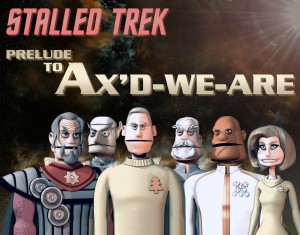
RYAN: And you know, what I just gave was the standard definition. But the fact of the matter is that you can get some kind of producer credit for any number of reasons: for helping to market or if you’re just a valuable asset, or sometimes people just fund a movie but they don’t have any part of the creative or the hiring. They’re just, like, “Hey, I’ll give you X amount of dollars, I get the executive producer credit. I get an equity share or the whole thing…” They’re more like an investor than anything else. So a lot of times, an executive producer is just an investor. A lot of times, an associate producer or a co-producer is just somebody that’s bringing in all the talents, like all the main actors or the director. Now why does he or she get a credit for that? Well, because without that person, maybe the movie or show doesn’t get funded. So they’re vital to the success of the production.
So that’s cool. I’m glad you got your co-producer credit. The first of many, hopefully!
JONATHAN: From your lips, dude! Okay, back to Blade of Honor. How did you manage to assemble cast, Ryan? Did you just call up folks on the phone? Do you go though their agents? Or do you chat with them at conventions or meet them in coffee shops? What’s the process?
Next time: we move on to the cast and production crew behind this new project. How are these people chosen? Who gets hired first? And what exactly is the difference between an independent sci-fi film like Blade of Honor and a “fan film”…or is there a difference?
Note: Currently , Blade of Honor has a Kickstarter going with a goal of $30,000. Even though that number has already been reached, their first stretch goal is $58,000…which will allow them to make episode 2. To find out more or to donate, click here.
